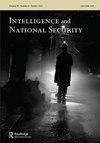20年过去了:情报和安全委员会调查“反恐战争”中的酷刑
IF 0.8
3区 社会学
Q1 HISTORY
引用次数: 0
摘要
摘要情报民主治理的核心目标是通过辩论和法律,建立公众对情报机构高效、有效和适当工作的信心。情报监督可以被视为机构、政府和监督员之间争夺信息控制权的竞争。信息控制的四个互动维度是保密、收集、评估和说服。本文通过信息控制的棱镜评估了情报与安全委员会(ISC)在调查2001年以来英国参与酷刑指控时的监督表现。在行政主导的总体背景下运作,这些维度构成了一系列过滤器,包括官员告诉经理的内容、机构记录的内容、他们告诉部长的内容、告诉监督机构的内容,以及ISC向公众报告的内容。本文章由计算机程序翻译,如有差异,请以英文原文为准。
Twenty years on: Intelligence and Security Committee and investigating torture in the 'war on terror'
ABSTRACT The central objective of democratic governance of intelligence is, through debate and law, to establish public confidence that the agencies work efficiently, effectively and properly. Oversight of intelligence can be seen as a contest between agencies, government and overseers for the control of information. The four interacting dimensions of information control are secrecy, gathering, evaluation and persuasion. This article assesses the oversight performance of the Intelligence and Security Committee (ISC) through the prism of information control in investigating the allegations of UK involvement in torture since 2001. Operating within an overall context of executive dominance, these dimensions constitute a series of filters including what officers tell their managers, what the agencies record, what they tell ministers, what they tell oversight bodies and, finally, what the ISC reports to the public.
求助全文
通过发布文献求助,成功后即可免费获取论文全文。
去求助
来源期刊

Intelligence and National Security
Multiple-
CiteScore
1.80
自引率
41.70%
发文量
93
期刊介绍:
Intelligence has never played a more prominent role in international politics than it does now in the early years of the twenty-first century. National intelligence services are larger than ever, and they are more transparent in their activities in the policy making of democratic nations. Intelligence and National Security is widely regarded as the world''s leading scholarly journal focused on the role of intelligence and secretive agencies in international relations. It examines this aspect of national security from a variety of perspectives and academic disciplines, with insightful articles research and written by leading experts based around the globe. Among the topics covered in the journal are: • the historical development of intelligence agencies • representations of intelligence in popular culture • public understandings and expectations related to intelligence • intelligence and ethics • intelligence collection and analysis • covert action and counterintelligence • privacy and intelligence accountability • the outsourcing of intelligence operations • the role of politics in intelligence activities • international intelligence cooperation and burden-sharing • the relationships among intelligence agencies, military organizations, and civilian policy departments. Authors for Intelligence and National Security come from a range of disciplines, including international affairs, history, sociology, political science, law, anthropology, philosophy, medicine, statistics, psychology, bio-sciences, and mathematics. These perspectives are regularly augmented by research submitted from current and former intelligence practitioners in several different nations. Each issue features a rich menu of articles about the uses (and occasional misuses) of intelligence, supplemented from time to time with special forums on current intelligence issues and interviews with leading intelligence officials.
 求助内容:
求助内容: 应助结果提醒方式:
应助结果提醒方式:


